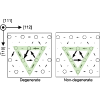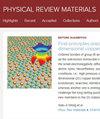有序铁磁钴中位错的核心结构
IF 3.4
3区 材料科学
Q2 MATERIALS SCIENCE, MULTIDISCIPLINARY
引用次数: 0
摘要
我们利用最新的磁键阶势 (BOP) [Egorov 等人,Phys. Rev. Mater. 7, 044403 (2023)],阐明了有序 B2 铁钴中螺旋位错的核心结构。我们证实了 B2 铁钴中的位错成对存在,被反相边界分隔。平衡分离约为 50 Å,这就要求进行大规模原子模拟--密度泛函理论无法实现,但 BOP 却可以做到。我们利用 BOP 对这些分离的位错进行了原子模拟,并预测它们位于退化的核心结构中。此外,位错还会引起局部电子结构和磁矩的变化。本文章由计算机程序翻译,如有差异,请以英文原文为准。

Core structure of dislocations in ordered ferromagnetic FeCo
We elucidated the core structure of screw dislocations in ordered B2 FeCo using a recent magnetic bond-order potential (BOP) [Egorov et al., Phys. Rev. Mater. 7, 044403 (2023)]. We corroborated that dislocations in B2 FeCo exist in pairs separated by antiphase boundaries. The equilibrium separation is about 50 Å, which demands large-scale atomistic simulations—inaccessible for density functional theory but attainable with BOP. We performed atomistic simulations of these separated dislocations with BOP and predicted that they reside in degenerate core structures. Additionally, dislocations induce changes in the local electronic structure and magnetic moments.
求助全文
通过发布文献求助,成功后即可免费获取论文全文。
去求助
来源期刊

Physical Review Materials
Physics and Astronomy-Physics and Astronomy (miscellaneous)
CiteScore
5.80
自引率
5.90%
发文量
611
期刊介绍:
Physical Review Materials is a new broad-scope international journal for the multidisciplinary community engaged in research on materials. It is intended to fill a gap in the family of existing Physical Review journals that publish materials research. This field has grown rapidly in recent years and is increasingly being carried out in a way that transcends conventional subject boundaries. The journal was created to provide a common publication and reference source to the expanding community of physicists, materials scientists, chemists, engineers, and researchers in related disciplines that carry out high-quality original research in materials. It will share the same commitment to the high quality expected of all APS publications.
 求助内容:
求助内容: 应助结果提醒方式:
应助结果提醒方式:


